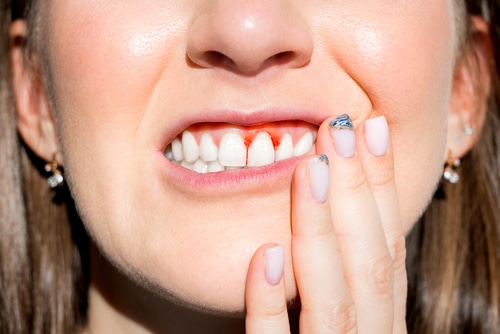Sore, inflamed gums are your mouth’s way of telling you there’s a problem. Most likely, you have gingivitis or the early stages of periodontal disease. Although it is reversible, it can quickly turn from bad to worse if it goes untreated.
If you think you have gum disease, contact a dentist right away for a thorough examination and diagnosis. Beginning treatment soon is the best way to prevent your condition from worsening.
What Is Periodontal Disease?
 Periodontal disease is an inflammation of your gums that makes them red and sore. Mild periodontal disease is known as gingivitis. Untreated gingivitis can lead to an advanced form of the disease known as periodontitis. Eventually, you’ll notice your gums pulling away from the teeth, becoming loose and potentially resulting in tooth loss.
Periodontal disease is an inflammation of your gums that makes them red and sore. Mild periodontal disease is known as gingivitis. Untreated gingivitis can lead to an advanced form of the disease known as periodontitis. Eventually, you’ll notice your gums pulling away from the teeth, becoming loose and potentially resulting in tooth loss.
This condition affects your overall well-being along with your oral health. Bacteria from gum disease can travel through your body via your bloodstream, affecting other organs. Patients with advanced periodontal disease are more likely to have heart disease.
What Leads to Developing Gum Disease?
You probably already know that your mouth is filled with bacteria. A good oral hygiene routine, like daily brushing and flossing, reduces harmful bacteria in your mouth. Dental checkups every six months allow your dentist to evaluate your oral health and address any concerns.
Falling out of your routine — brushing less than twice a day or forgetting to floss — can lead to bacteria growth and, eventually, periodontal disease. Poor oral hygiene is one of the primary causes of periodontal disease, but other contributing factors include:
- Tobacco use
- Genetics
- Medications
- Other health conditions
Periodontal disease can also worsen with hormonal changes due to puberty, menstruation, and pregnancy.
Symptoms of Periodontal Disease
Periodontitis is sometimes a silent disease. It may not cause any pain until it reaches the advanced stages. Other signs of a periodontal infection include:
- Bleeding while brushing your teeth
- Itchy or sore gums
- Red, swollen gums
- Gum recession
- Oozing pus when you press down on your gums
- Chronic bad breath
- Changes in your bite
- Loose teeth
If any of these signs sound familiar, you may have periodontal disease and should contact a dentist for an evaluation.
Can I Prevent Periodontal Disease?
The best way to prevent gum disease is by consistently brushing and flossing. Eating a well-balanced diet and managing stress also contribute to better overall oral health.
If periodontal disease is caught in the early stages, you can prevent it from causing lasting damage. Chronic gum disease can be stopped with targeted treatments, such as scaling and root planing.
Treating Periodontal Disease
Early forms of gum disease may be reversed by changing your oral hygiene habits. However, more advanced cases require scaling and root planing to remove bacteria accumulated on the tooth surface below the gums.
Other forms of treatment include:
- Antibiotics to treat the infection
- Gum surgery to remove diseased gum tissues
- Bone grafting when there is a significant amount of bone loss
After treatment, your dentist will encourage healthy at-home habits to ensure the disease doesn’t return.
Schedule A Free Consultation Today
Periodontal disease should not be left untreated. Schedule an appointment with Diana Rodriguez & Associates for a free consultation to evaluate the condition of your gums.
